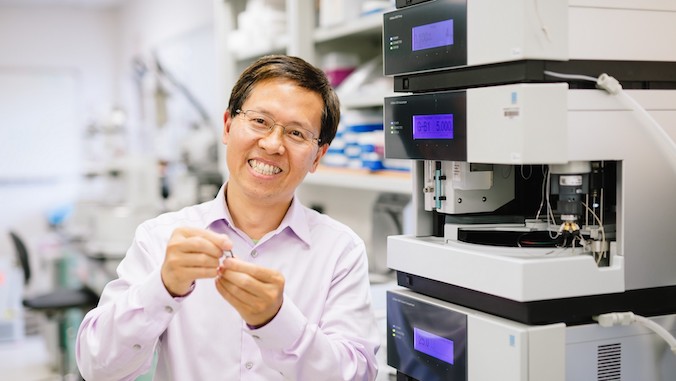
A University of Hawaiʻi researcher has identified a rare bacterium that is active against certain cancers. The bacterium, Lentzea flaviverrucosa, that produces petrichorin A, was discovered by Shugeng Cao, associate member of the Cancer Biology Program at the UH Cancer Center, and co-investigators Chunshun Li and Xiaohua Wu, in collaboration with Joshua Blodgett of Washington University in St. Louis. The research team proved that petrichorin A is active against cancers such as ovarian cancer, fibrosarcoma, prostate cancer and T-cell leukemia.
These findings were published in the Proceedings of the National Academy of Sciences of the United States of America.
Petrichorin A is a peptide that contains special amino acids, and each amino acid has a nitrogen-nitrogen bond. Petrichorin A, a dumbbell-like natural product, was evaluated for anti-cancer activity against multiple cancer cell lines. The researchers conducted a preliminary test and discovered that petrichorin A was not toxic to a normal human cell line. With this observation, his team proved that petrichorin A was active against ovarian cancer, fibrosarcoma, prostate cancer and T-cell leukemia. This highlighted the importance of including petrichorin A in future research of pharmaceutical design and discovery programs.
“Cancer is the second leading cause of death in Hawaiʻi and nationally, after cardiovascular disease,” said Cao. “If petrichorin A were developed successfully, people in Hawaiʻi and the Pacific would benefit from our drug therapies.”
Cao currently serves as a professor at the Daniel K. Inouye College of Pharmacy (DKICP) at UH Hilo. Wu is a senior research associate at DKICP, and Li, a previous postdoctoral fellow in Cao’s lab, is a scientist at Antheia, Inc.
This research is an example of UH Mānoa’s goal of Excellence in Research: Advancing the Research and Creative Work Enterprise (PDF), one of four goals identified in the 2015–25 Strategic Plan (PDF), updated in December 2020.

